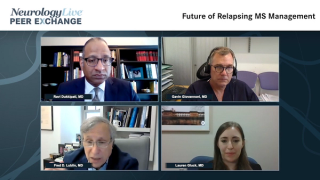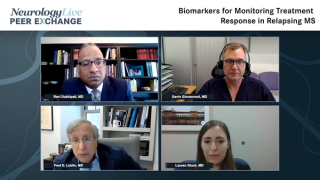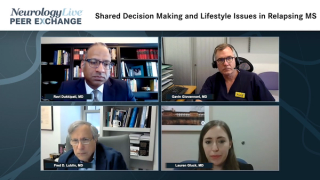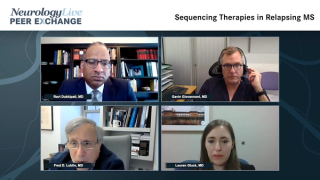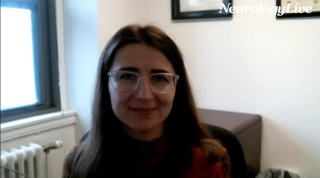
MS and Demyelinating Disorders
Latest News
Video Series

Latest Videos
Podcasts
CME Content
More News

As part of NeurologyLive®'s Year in Review 2025, we've compiled the most-listened episodes this year of our biweekly podcast, Mind Moments®.

A look back at clinician-led features from 2025 that examine the questions, data, and decisions shaping neurologic care.

A trio of neurology experts discussed the clinical application of the 2025 updated multiple sclerosis diagnostic criteria, including imaging and biomarker tools, to support patient care.

As part of NeurologyLive®'s Year in Review, take a look at our top expert interviews regarding multiple sclerosis in 2025.

Explore the transformative buzzwords in neurology for 2025, highlighting advancements in AI, gene therapy, personalized treatment, and neuroplasticity.

Continuem's PIPE-307 trial for relapsing-remitting multiple sclerosis failed to meet primary goals, yet the company remains committed to exploring future therapies.

Neurology News Network for the week ending December 20, 2025. [WATCH TIME: 4 minutes]

GLP-1 research in neurology is on the rise, with several pivotal studies lending insights into their role.

Sanofi's tolebrutinib fails to meet key trial endpoints for multiple sclerosis, delaying FDA review and raising questions about its future in treatment.

Baptist Health Brain & Spine enhances its neurology leadership with Peter Abdelmalik, MD, focusing on patient care, education, and operational efficiency.

Take 5 minutes to catch up on NeurologyLive®'s highlights from the week ending November 28, 2025.

Findings revealed that vitamin D deficiency was associated with an increased risk of NMOSD in East Asian populations, whereas the effect of smoking among Caucasians and other populations was inconsistent.

Natalizumab-sztn is an FDA-approved monotherapy for all indications of the reference product natalizumab, including relapsing forms of multiple sclerosis and Crohn disease.
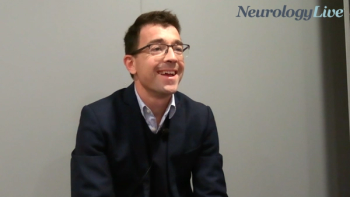
The neurologist at the Multiple Sclerosis Center of Catalonia talked about the challenges of defining seronegative in new diagnostic criteria for neuromyelitis optica spectrum disorder [WATCH TIME: 5 minutes]

A recent study confirms satralizumab's long-term safety and efficacy for treating neuromyelitis optica spectrum disorder, supporting its use as a maintenance therapy.

A case report reveals cognitive decline and brain atrophy in a patient with NMOSD, highlighting potential subclinical neurodegeneration despite limited relapses.

Take 5 minutes to catch up on NeurologyLive®'s highlights from the week ending November 21, 2025.

In a newly published study, researchers developed expert-driven, evidence-based, up-to-date consensus recommendations for managing neuromyelitis optica spectrum disorder in Saudi Arabia.

At ECTRIMS 2025, the associate professor at Pontifical Catholic University of Chile discussed global challenges in diagnosing multiple sclerosis early. [WATCH TIME: 5 minutes]

Spencer Hutto, MD, associate program director of the adult neurology residency at Emory University, outlined the key diagnostic nuances, treatment considerations, and emerging therapeutic strategies shaping modern neurosarcoidosis care.

Cladribine shows superior efficacy over S1P modulators in reducing disability progression in treatment-naive relapsing-remitting MS patients.

The assistant professor of neurology at Northwestern University explained key diagnostic, therapeutic, and management considerations for clinicians caring for patients with NMOSD across diverse and evolving clinical scenarios.
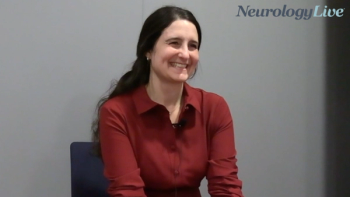
At ECTRIMS 2025, the staff neurologist at Cleveland Clinic’s Mellen Center for MS discussed developing a machine-learning tool to predict individualized risk of recurrent disease activity in multiple sclerosis. [WATCH TIME: 6 minutes]

Findings from a second phase 3 trial, dubbed FENhance 1, assessing fenebrutinib in patients with relapsing multiple sclerosis are anticipated by the first half of 2026.

Here's some of what is coming soon to NeurologyLive® this week.









